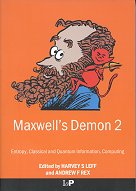This book, Maxwell’s Demon: Entropy, Information, Computing, brings under one cover twenty-five reprints, including seminal works by James Clerk Maxwell and William Thomson; historical reviews by Martin Klein, Edward Daub and Peter Heimann; important contributions by Leo Szilard, Leon Brillouin, Dennis Gabor and Jerome Rothstein; and remarkable innovations by Rolf Landauer and Charles Bennett. Until now this important material has been scattered throughout diverse journals.
Maxwell’s Demon: Entropy, Information, Computing makes the key literature easily available and helps with the cross-fertilisation of ideas in different disciplines. An annotated chronological bibliography provides a colourful perspective on Maxwell’s demon and a rich trail of citations for further study.
Contents
- • William Thomson. Kinetic theory of the dissipation of energy. Nature, IX. 1874
- • Edward E. Daub. Maxwell's demon. Stud. Hist. Phil. Sci., 1. 1970
- • Martin J. Klein. Maxwell, his demon, and the second law of thermodynamics. Am. Sci., 58. 1970
- • L. Brillouin. Life, thermodynamics, and cybernetics. Am. Sci., 37. 1949
- • Jerome Rothstein. Information, measurement, and quantum mechanics. Science, 114. 1951
- • Leo Szilard. On the decrease of entropy in a thermodynamic system by the intervention of intelligent beings. Behavioural Science, 9. 1964
- • L. Brillouin. Maxwell's demon cannot operate: information and Entropy I. J. Appl. Phys., 22. 1951
- • J. M. Jauch, J. G. Baron. Entropy, information and Szilard's paradox. Helv. Phys. Acta., 45. 1972
- • Olivier Costa de Beauregard, Myron Tribus. Information theory and thermodynamics. Helv. Phys. Acta., 47. 1974
- • Rolf Landauer. Irreversibility and heat generation in the computing process. IBM J. Res. Dev., 5. 1961
- • Wojciech H. Zurek. Maxwell's demon, Szilard's engine and quantum measurements. Frontiers of Non-Equilibrium Statistical Physics. 1984
- • Elihu Lubkin. Keeping the entropy of measurement: Szilard revisited. Int. J. Theor. Phys., 26. 1987
- • Charles H. Bennett. The thermodynamics of computation---a review. Int. J. Theor. Phys., 21. 1982
- • Rolf Landauer. Computation: a fundamental physical view. Phys. Scr., 35. 1987
- • Charles H. Bennett. Notes on the history of reversible computation. IBM J. Res. Dev., 32. 1988
- • P. M. Heimann. Molecular forces, statistical representation and Maxwell's demon. Stud. Hist. Phil. Sci. 1, 213-27. 1970
- • Kenneth Denbigh. How subjective is entropy?. Chem. Brit. 17, 168-85. 1981
- • Alvin M. Weinberg. On the relation between information and energy systems: a family of Maxwell's demons. Interdisciplinary Sci. Rev. 7, 47-52. 1982
- • Richard C. Raymond. The well-informed heat engine. Am. J. Phys. 19, 109-12. 1951
- • C. Finfgeld, S. Machlup. Well-informed heat engine: efficiency and maximum power. Am. J. Phys. 28, 324-6. 1960
- • Philip Rodd. Some comments on entropy and information. Am. J. Phys. 32, 333-5. 1964
- • Dennis Gabor. Light and information. (section 5, appendix IV) Progress in Optics 1, 111-53. 1964
- • Andrew F. Rex. The operation of Maxwell's demon in a low entropy system. Am. J. Phys. 55, 359-62. 1987
- • Charles H. Bennett. Logical reversibility of computation. IBM J. Res. Dev. 17, 525-32. 1973
- • Richard A. Laing. Maxwell's demon and computation. Phil. Sci. 41, 171-8. 1974

